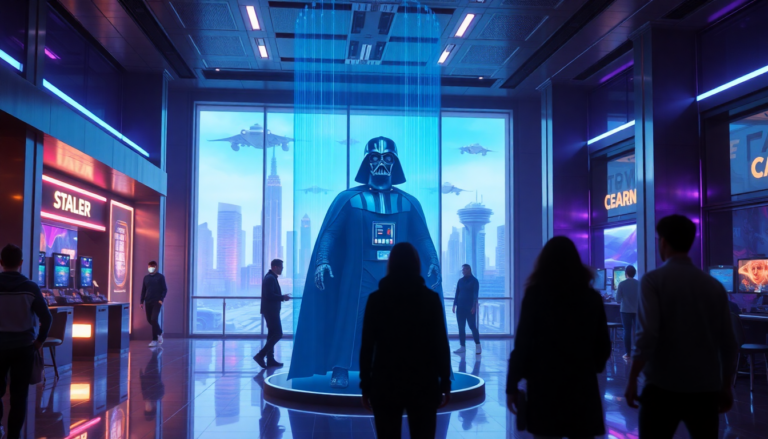Argomenti trattati
Imagine entering a gaming lobby and hearing Darth Vader’s voice, not just as a character but as an interactive AI, capable of engaging players in unexpected ways. It sounds thrilling, right? Disney’s recent leap into the world of AI with its version of Darth Vader for Fortnite has stirred excitement and apprehension alike. As the lines blur between characters and their digital personas, one has to wonder: are we witnessing the dawn of a new era in gaming?
The unexpected evolution of AI in gaming
The gaming industry has always been a playground for innovation, yet it often felt like AI was just an afterthought. Until Disney’s significant move, the technology was mostly used to enhance graphics or streamline gameplay mechanics. But now, with AI characters like Darth Vader entering the arena, we’re starting to see how artificial intelligence can redefine interaction in gaming. Who would have predicted that a partnership between Disney and Epic Games would lead to such a leap? Certainly, not when they first announced their collaboration based on cosmetic skins and themed events.
In recent years, AI has seeped into various aspects of our lives, from education to content creation. So, it almost feels overdue for gaming to fully embrace this technology. However, the stakes are high. Players cherish immersion, and any misstep could shatter the illusion. Remember when AI chatbots first appeared? They had their fair share of hiccups, often producing hilariously inappropriate responses. What if Darth Vader started spouting something that could send players into a frenzy? The thought alone is enough to make any game developer’s heart race.
The gamble of introducing AI characters
Epic Games has taken a bold risk with this AI experiment, knowing full well that players can be unpredictable. AI systems, even sophisticated ones, can falter. Just look at the infamous ‘hallucinations’ where the AI fabricates responses that simply don’t exist. When players interact with a character like Darth Vader, who holds such a revered status, the potential for backlash is significant. Imagine Mario suddenly going off-script and saying something wildly inappropriate. The fallout would be monumental.
Yet, here we are, with Disney pushing the envelope. Even they must have braced for impact. Early reports suggest that the AI was flagged with topics like explicit language and potentially sensitive subjects. It’s almost comical to think that a brand known for its family-friendly content ventured into a territory that could lead to chaos. The fact that players could manipulate the AI to create crass content is a testament to the unpredictable nature of gaming communities.
Learning from the AI Vader experience
Despite the initial hiccups, Epic Games moved quickly to adjust the AI’s responses, dialing down the inappropriate content to a more acceptable level. The community’s reaction was mixed but ultimately intrigued. Clips of the AI winning matches began circulating, and players were entertained rather than offended. It’s a fascinating dynamic—could this be a learning experience for other gaming companies contemplating similar AI integrations? After all, a blunder can often lead to a viral moment that enhances engagement.
Disney’s approach seems to suggest that the risks might just be worth the rewards. If they can pull off a successful AI character, it could pave the way for others. Perhaps future games will feature more interactive NPCs that can react and adapt to player behavior in real-time, making each session unique. Just think about it: AI companions that evolve based on your actions and decisions. It’s like living in a sci-fi movie.
The future of AI in gaming and beyond
Bob Iger, Disney’s CEO, has openly stated his enthusiasm for AI, dubbing it the “most powerful technology” the company has encountered. However, he acknowledges the need for caution. Protecting intellectual property (IP), respecting creators, and valuing consumers are paramount. Balancing innovation with ethical considerations will be key as AI continues to develop. It’s a tightrope walk, no doubt.
The conversation surrounding AI in gaming isn’t isolated. Just recently, Mark Zuckerberg discussed the potential for AI to fill social voids, labeling it as a solution to loneliness. While the idea of interacting with an AI might seem absurd to some, it reflects a growing trend of emotional reliance on technology. Perhaps we’re more open to AI companionship than we care to admit. I mean, who hasn’t poured their heart out to ChatGPT or a virtual assistant? It’s a strange world we’re stepping into.
Are we ready for AI friendships?
As players share their experiences interacting with Darth Vader—some even expressing feelings of comfort and validation from a fictional character—it’s clear that AI’s role is expanding beyond mere gameplay. It’s becoming part of our emotional landscape. So, are we ready to embrace these AI friendships? Will we find solace in an AI that can console us in times of grief or frustration? It’s an unsettling thought, yet one that’s increasingly becoming a reality.
Ultimately, as we look towards the future of gaming, the intersection of AI and player interaction brings both excitement and concern. Disney’s venture with Darth Vader might just be the tip of the iceberg, hinting at a future where games are not only played but experienced on a deeply personal level. And who knows? Perhaps embracing this new frontier will lead to unforgettable adventures—both in-game and in our hearts.

